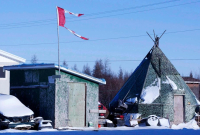Support strong Canadian climate journalism for 2025
Canada has made progress improving its human rights record in the last year, Amnesty International says, but has "stumbled" or "failed" in a number of areas — including indigenous rights, Justin Trudeau’s cornerstone commitment.
Alex Neve, the secretary general of Amnesty International Canada, says Trudeau’s Liberal government has demonstrated leadership in areas such as transgender rights and fighting the death penalty around the world.
But Canada loses points from Amnesty for approving a multibillion−dollar sale of arms to Saudi Arabia and for granting permits for Site C, a controversial dam and hydroelectric proposal in B.C.
Neve calls the decision to abandon the Northern Gateway pipeline a victory for indigenous rights, but says the government has moved ahead with Site C and other projects "without indigenous consent."
When she was regional chief for the Assembly of First Nations in 2012, Jody Wilson−Raybould — now Trudeau’s justice minister — said Site C ran "roughshod"over aboriginal rights and title.
The Fisheries Department says it approved permits for the project in July following "extensive First Nations consultations," noting the approval came with 40 separate conditions.
Neve describes a disconnect between the prime minister’s aspirational statements about a new relationship with indigenous peoples in Canada and what’s happening on the ground.
"We are worried indigenous rights are not being adequately protected in the face of a strong push to move forward with a resource development agenda in Canada," he said.





Comments
Adidas Zx Flux Slip On Dame
Dress yourself in tiers. Several good sportfishing journeys may last the whole day, and even on shorter travels, the temp can alter substantially. By putting on a lot of light tiers of clothing, you can expect to give yourself lots of alternatives. With a bit of slight adjustments, you can make on your own comfy, no matter what the actual temp is.
https://www.mf-hirrlingen.de/images/mf-hirrlingen/2332-ray-ban-aviator-…
An excellent idea for each web development company available is always to analysis their potential audience. Comprehending what sort of men and women will be using the site is a great method to choose how to build it. Make sure it is a site that this audience will probably be secure employing.
https://www.terravilla.nl/images/ter2/19539-vibram-schoenen-amsterdam.j…